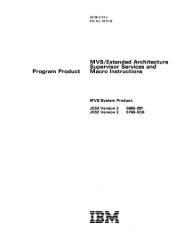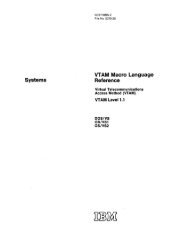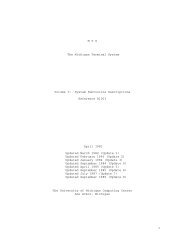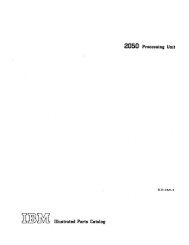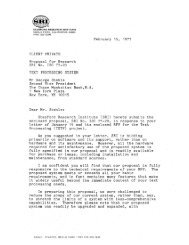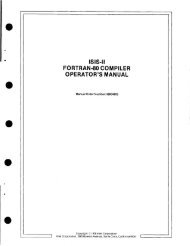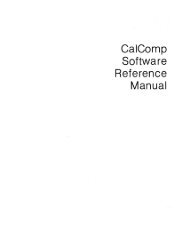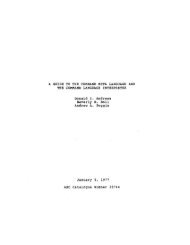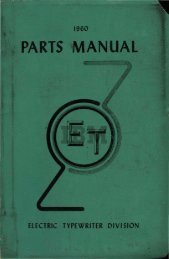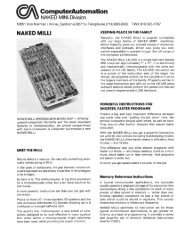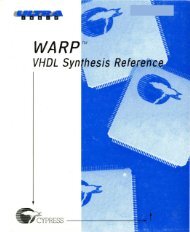TOPS-20 PASCAL Language Manual - Bitsavers
TOPS-20 PASCAL Language Manual - Bitsavers
TOPS-20 PASCAL Language Manual - Bitsavers
Create successful ePaper yourself
Turn your PDF publications into a flip-book with our unique Google optimized e-Paper software.
<strong>PASCAL</strong> DATA TYPES<br />
Example 3<br />
F I 1...[<br />
TY'ial<br />
Datf:'~<br />
OF RECOf~D<br />
INTEGER;<br />
RECOF~D<br />
Month: (Jan, Feb, Mar, Apr, Mas, Jun,<br />
Jul, Aug, Sep, Oct, Nov, Dec);<br />
D a ~:1 : 1.. 3 l ~<br />
Y€·~ar : INTEGER<br />
END;<br />
Temp, Pressure : INTEGER;<br />
Yield, Purits : REAl...<br />
END;<br />
The VAR Declaration specifies a file of records. To access the fields<br />
of the record components, you specify ResultsA.Trial,<br />
ResultsA.Date.Month, and so on.<br />
2.3.4.1 Internal and External Files - A file that is local to a<br />
program or subprogram is called an internal file. You can use an<br />
internal file only within the scope of the program or subprogram in<br />
which it is declared. The system retains an internal file only during<br />
execution of the declaring program or subprogram. After execution the<br />
file is no longer accessible. The system creates a new file variable<br />
with the same name the next time it executes the declaring unit. The<br />
contents of the old file are not available. Internal files are not<br />
specified in the program heading. Only internal files can be<br />
components of structured types.<br />
An external file exists outside the scope of the program in which it<br />
is declared. An external file can be created by the current <strong>PASCAL</strong><br />
program, another <strong>PASCAL</strong> program, or a program written in another<br />
language. The system retains the contents of external file variables<br />
after the execution of the program. You must specify the names of<br />
external file variables in the program heading. External files cannot<br />
be part of a structured type.<br />
2.3.4.2 Text Files - A text file is a file with components of type<br />
CHAR. <strong>PASCAL</strong> defines a file type called TEXT. To declare a text<br />
file, specify a variable of type TEXT, for example:<br />
VAR Poem<br />
TEXT;<br />
The text file variable POEM is a file of characters. Text files are<br />
divided into lines. Each line ends with a line-separator character.<br />
You cannot use this character directly, but you can refer to it<br />
indirectly through the predeclared procedures READLN and WRITELN and<br />
the predeclared function EOLN.<br />
The pred~clared file variables INPUT and OUTPUT are files of type<br />
TEXT. These files are the defaults for all the predeclared text file<br />
procedures described in Chapter 7. Note that TEXT is not equivalent<br />
to FILE OF CHAR.<br />
Example<br />
VAR Guide, <strong>Manual</strong>:<br />
TEXT;<br />
This example declares the Variables Guide and <strong>Manual</strong> as text files.<br />
2-25



